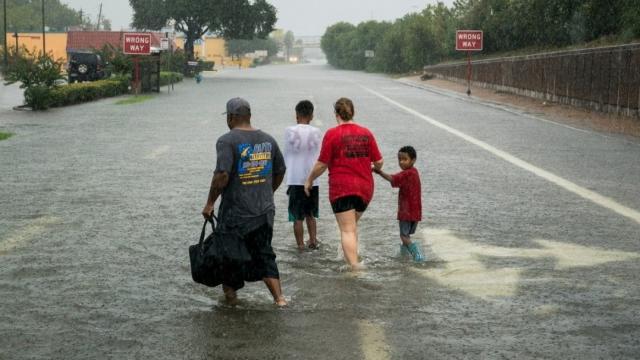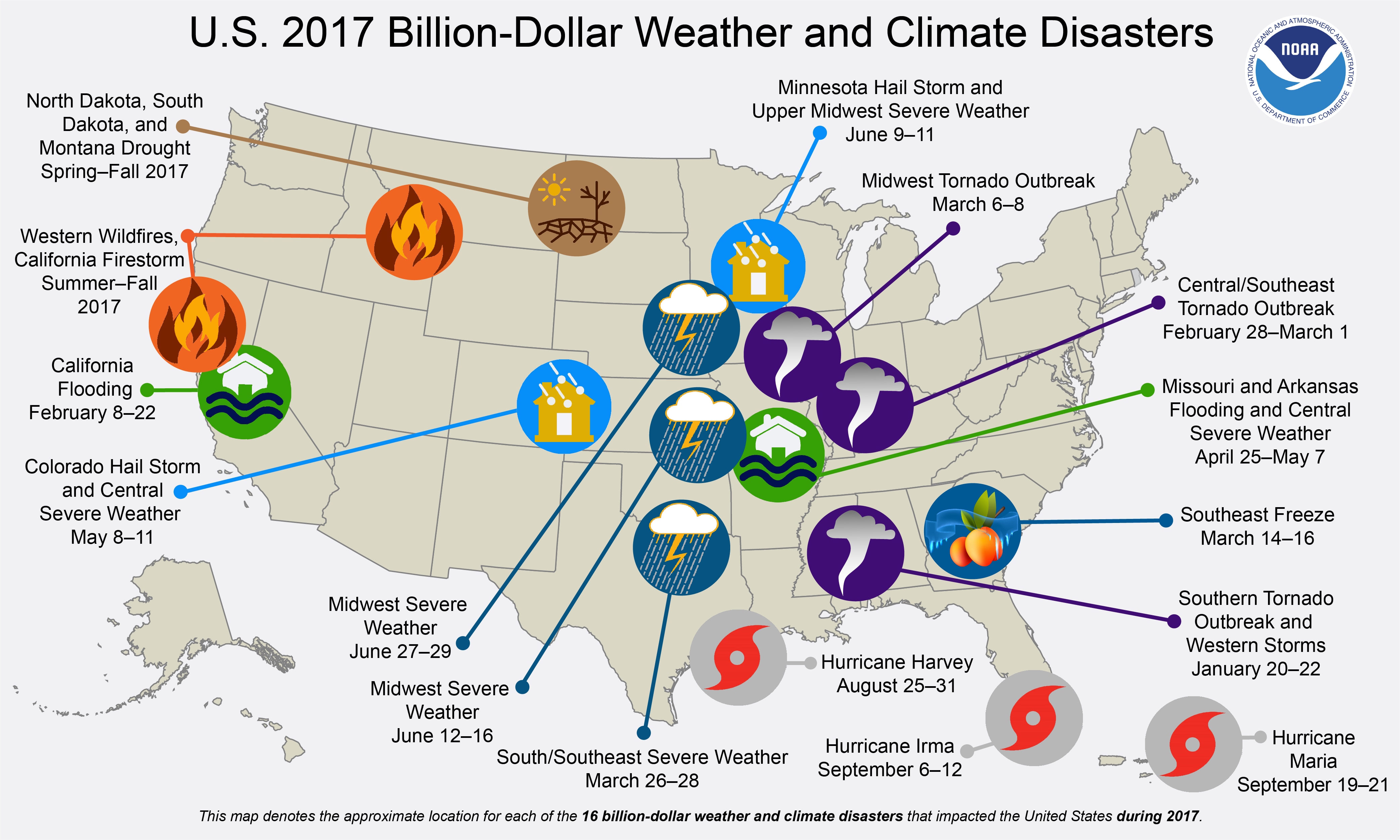
Hurricanes Harvey, Irma and Maria combined with devastating Western wildfires and other natural catastrophes to make 2017 the most expensive year on record for disasters in the United States, the National Oceanic and Atmospheric Administration reported Monday.
The disasters caused $306 billion in total damage in 2017, with 16 events that caused more than $1 billion in damage each. The bulk of the damage, at $265 billion, came from hurricanes.
“2017 was a historic year for billion-dollar weather and climate disasters,” said Adam Smith, an economist for NOAA, on a call with reporters.
The record-breaking year raises concerns about the effects of future natural disasters, as scientists fear climate change could make extreme weather events more damaging.
Hurricane Harvey, which sparked extreme flooding in Houston and the surrounding area in August and September, caused $125 billion in damage, the year’s most expensive disaster. Hurricane Maria, which in September set off a fatal and ongoing humanitarian crisis in the U.S. territory of Puerto Rico and elsewhere, caused $90 billion in damage. Hurricane Irma raked across the Caribbean and hit Florida in September, causing $50 billion in total damage, NOAA reports.
The storms also caused 251 combined deaths, the report found. According to Smith, Hurricanes Harvey, Irma and Maria now join 2005’s Katrina and 2012’s Sandy among the five most costly U.S. hurricanes in the agency’s disaster record.
Western wildfires cost an additional $18 billion and 54 lives, the report found. This, too, was an annual record. Other large costs came from tornadoes, droughts, flooding and other severe weather events.
The previous most expensive disaster year was 2005, when events such as Hurricane Katrina caused $215 billion in U.S. damage when adjusted for inflation. NOAA’s record of billion-dollar natural disasters goes back to 1980.
According to NOAA, there have been 215 U.S. disasters costing $1 billion or more since 1980, for a total of more than $1.2 trillion in damage. The year 2017 tied 2011 for the largest total number of such events, at 16.
With numbers like the ones above, it’s no wonder the insurance industry also took a massive hit during 2017, thanks in large part to the trio of hurricanes that ravaged parts of the Caribbean, Puerto Rico and parts of the South.
Insurers are set to pay out a record $135 billion stemming from natural disasters around the globe last year, according to data released this month from the world’s largest reinsurer.
Those huge payouts stem largely from last year’s deadly and devastating hurricanes, but those were far from the only disasters. Widespread flooding caused by monsoon rains in South Asia also contributed to the costs, as did a severe earthquake in Mexico, according to Munich Re, a German-based reinsurer.
Overall losses, which include uninsured losses, amounted to about $330 billion, the reinsurer said. That is second only to 2011, when a massive earthquake and tsunami in Japan fueled overall losses of more than $350 billion in today’s dollars.
The firm identified 710 natural catastrophes around the globe, significantly higher than the annual average of 605. But those in the United States were by far the most costly, accounting for roughly half of all insurance payouts.
Insurance officials also said they expect more such catastrophes ahead.
“Some of the catastrophic events, such as the series of three extremely damaging hurricanes, or the very severe flooding in South Asia after extraordinarily heavy monsoon rains, are giving us a foretaste of what is to come,” Torsten Jeworrek, a Munich Re board member, said in an announcement about the global losses. “Because even though individual events cannot be directly traced to climate change, our experts expect such extreme weather to occur more often in future.”
Indeed, the key question underlying the latest tally of disaster cost is to what extent climate change may be driving the United States and the rest of the world toward more numerous or more severe disasters.
NOAA experts demurred on this question on a media call, declining to apportion how much of the damage could be attributed to a changing climate as opposed to other factors. One key factor that is also known to be worsening damage is that there is more valuable infrastructure, such as homes and businesses, in harm’s way — along coastlines or in areas vulnerable to wildfire.
“For the purposes especially of this product, we do not try to parse those apart,” said Deke Arndt, chief of the monitoring section at NOAA’s National Centers for Environmental Information. “We’re more interested in quantifying what’s going on. Both the economists and physical scientists will retrospectively look at that, but those sort of happen at the speed of science.”
But one expert, Harvard oceanographer and climate expert James McCarthy, highlighted the role of climate change in a statement in response to the NOAA findings.
“We can expect extreme weather events and economic losses and costs associated with them to continue increasing unless we make dramatic reductions in greenhouse gas emissions,” McCarthy said.
McCarthy authored a recent report with Robert Watson, the former chairman of the United Nations’ Intergovernmental Panel on Climate Change, and Liliana Hisas, the executive director of the Universal Ecological Fund (FEU-US), arguing that U.S. $ 1 billion disasters are increasing over time and suggesting economic costs from such events will only increase under climate change.
“As we both know hurricanes, wild-fires, floods and severe weather events occur naturally,” said Watson by email. “However, the data shows an overall increased frequency in these events, and an associated increase in intensity. The precautionary principle would suggest that we should assume a significant contribution from human activities and prepare to adapt and mitigate.”
3 WAYS TO SHOW YOUR SUPPORT
- Log in to post comments












